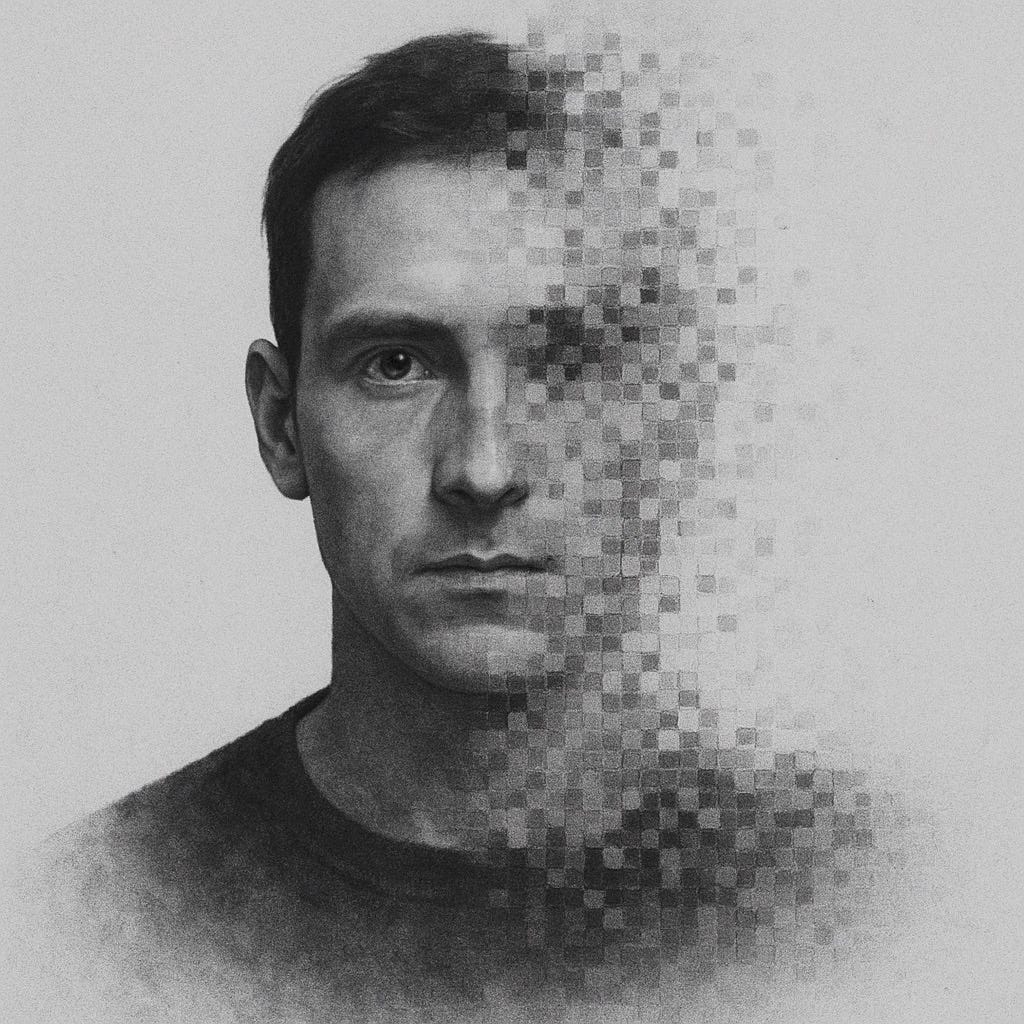There are five core beliefs that distort the lives of nearly everyone I’ve ever encountered — not because they’re hidden, but because they’re mistaken for truth. Most people don’t question them. They organize their healing around them. They shape their relationships, their identity, and even their sense of purpose in response to them. This isn’t an exploration of feelings. It’s a diagnosis of structure. If you see yourself in any of what follows, that’s not failure. It’s a door. People build their entire lives around these beliefs. Not because they’re weak. But because the world rewards them. The need to be enough. The hunger to be seen. The quiet belief that something is wrong with them. The fear that truth will ruin everything. The collapse that follows when they’re no longer anyone at all.
If you’ve spent years trying to heal, grow, or transform and still feel haunted by the same emptiness — this is why.
“I’m Not Enough. And I Never Have Been.”
Most people won’t say this directly. Instead, it shows up in the questions they ask, in the way they shrink their desires, in the urgency they bring to their healing. It hides under “How can I fix this?” and “Why do I keep attracting the same thing?” But the core of it is always the same: a long-held belief that there is something fundamentally lacking in who they are. It’s not a surface-level insecurity — it’s structural. It lives beneath their identity, influencing how they form relationships, how they pursue success, and how they process failure. Even their growth becomes a disguise for it.
This belief rarely begins with language. It begins with pattern. Someone responded to their presence with absence, or to their emotion with punishment. Over time, this gets internalized as proof. The nervous system doesn’t track injustice — it tracks response. So if love was withheld, if attention was only given under certain conditions, the body absorbs the idea: I am only worthy if I earn it. The rest of life becomes an attempt to earn what was never freely given. People build entire personalities around trying to become someone who finally deserves to stay.
What makes this pain so complex is that it’s often rewarded. The people who carry this belief tend to over-function. They over-deliver in relationships. They anticipate other people’s needs. They’re often highly empathic and self-aware. But it doesn’t come from fullness — it comes from fear. Even their generosity is haunted. Because at the root of it all is the unspoken thought: if I stop doing, if I stop proving, if I just am — they’ll leave. Or worse, they’ll see who I really am underneath all the effort, and confirm what I’ve always feared: that it was never enough to begin with.
This isn’t something that affirmations can fix. It doesn’t disappear because someone finally tells you you’re worthy. In fact, many people reject love when it’s finally offered freely, because it doesn’t match the internal script they’ve spent a lifetime living by. The belief that you’re not enough distorts reality. It warps what you hear, how you receive, and what you believe is possible. And until it’s named directly — not spiritually bypassed, not rebranded as a “lesson,” but actually seen for what it is — it will quietly drive every decision, relationship, and desire you have.
I Don’t Feel Seen — and I Don’t Know If I Ever Will Be
There is a specific kind of pain that comes from being articulate, self-aware, and observant — and still feeling invisible. It’s not about attention or approval. It’s about recognition. The ache isn’t from being ignored; it’s from being engaged on the surface while your deeper reality remains untouched. You express yourself clearly. You try softness. You try directness. You simplify, you rephrase, you wait for the right moment. And still, no one mirrors back what you actually meant. Not fully. Not accurately. Not in a way that tells your nervous system, “Yes, that’s what I was trying to say.”
This isn’t about being difficult to understand. Most people who carry this pain are easy to understand — they’ve spent years learning how to translate their internal world for others. But the problem is that the world often prefers something smaller, flatter, more convenient. Nuance takes effort. Depth requires presence. So people respond to what’s familiar, digestible, or useful to them — and miss everything else. Over time, the person carrying that depth starts to withdraw. They stop expecting real resonance. They say less, or they say what’s expected. They grow quieter not because they have nothing to say, but because they’ve learned that saying it doesn’t guarantee being seen.
Being unseen in this way doesn’t just create loneliness — it creates self-doubt. You start to wonder if you’re making things too complicated. If maybe you’re the problem. If your perception is distorted or your expectations are too high. You might even start editing your truth down into pieces small enough for others to digest, just to feel some kind of response. And then you feel sick. Because you know what you’ve just done: you’ve abandoned the part of you that wanted to be known.
At some point, most people stop trying. Not because they’re done growing, but because they’re tired of translating themselves into languages that never fit. And the longer they stay unseen, the more invisible they become — even to themselves.
Something Is Wrong With Me — and Everything I Do Is to Outrun It
This belief doesn’t always come in words. It starts as a feeling — a quiet but persistent sense that something inside you is broken or off. For some, it’s there from childhood. For others, it shows up the moment they realize they’re not like the people around them. It doesn’t matter how it starts. Once it’s in place, everything in your life begins to orbit around it. It shapes how you relate, how you achieve, how you try to heal. You don’t just want to improve — you have to, because deep down you’ve come to believe that what you are now isn’t acceptable.
This is the engine behind overachievement, perfectionism, hyper-independence, even spiritual obsession. People think you’re strong. Focused. Deep. But underneath it, you’re driven by fear. You’re afraid that if you stop fixing, stop proving, or stop performing, the thing you’ve kept buried will surface — and everyone will see it. Not just your insecurities, but the core defect you’ve tried to hide: the one that tells you you’re fundamentally wrong, fundamentally bad, fundamentally unworthy of being loved exactly as you are.
What makes this so painful is that it gets tangled up with growth. You can dress it in better language. You can call it transformation, or personal evolution, or “doing the work.” But if the thing driving it is shame — if what you’re really doing is trying to make up for being broken — then even your healing becomes a form of self-rejection. You’re not integrating. You’re erasing. And eventually, it doesn’t matter how much you learn or how many patterns you release. The original wound is still there, untouched, reinforced by every attempt to escape it.
This belief doesn’t need more analysis. It needs to be exposed. Not as truth, but as a framework you inherited — one that kept you moving, improving, and trying not to fall apart. The work is not to finally outrun it. The work is to see that it was never yours to carry in the first place.
If I Say the Truth, I’ll Lose Everything
This isn’t hypothetical. It’s a calculation. You know exactly what your truth will cost. You’ve run the scenarios in your head. You’ve imagined the reactions. You’ve considered the fallout. And so you stay quiet — not because you’re confused, but because you’re clear. You know that if you say what you really see, what you really feel, what you really know, something will break. A relationship. A role. A version of you that someone else needs you to keep performing. That’s the trap. You’re not just protecting yourself — you’re protecting the ecosystem that depends on your silence.
People like to frame this as repression or people-pleasing. But that’s too simplistic. This is structural. You’ve often been the one holding everything together — the one others depend on to be reasonable, to be stable, to be forgiving. Your silence isn’t weakness. It’s a form of maintenance. You’ve been trained to manage other people’s discomfort, to soften your truth so it doesn’t rupture their narrative. Over time, that training becomes instinct. You don’t even notice how often you edit yourself, how often you bend reality just enough to keep the peace. But your body notices. Your truth doesn’t disappear. It just gets buried under exhaustion, resentment, or illness.
Eventually, the truth starts to leak out. Not in elegant declarations, but in symptoms. You become irritable. You feel detached. You fantasize about disappearing. And even if no one sees the truth you’re holding, they start to feel your absence. Something about you goes quiet. Not on the outside — but in the places that used to burn with conviction. You don’t know how much longer you can do it. And the scariest part isn’t losing the people around you. It’s losing your connection to yourself.
There comes a point where the truth becomes louder than the consequences. Not because the fallout disappears, but because what you’re sacrificing to avoid it becomes unbearable. That moment is terrifying. It’s also the beginning of real life.
I Don’t Know How to Live Without a Script
Letting go of an old identity is often celebrated as freedom. You shed the roles. You stop performing. You leave the job, the relationship, the belief system — and for a while, it feels like liberation. But then the silence sets in. Not the peaceful kind — the kind that echoes. The kind that asks, “Now what?” You thought clarity would come rushing in to fill the space where structure used to be, but it doesn’t. You’re left without direction, without rhythm, without a framework to tell you who you are. And the world doesn’t rush in to catch you. It keeps spinning, expecting you to reinsert yourself with a new label, a new story, a new plan. But what if there isn’t one?
Most people don’t realize how much of their life was built on scripts — inherited expectations, cultural definitions of success, spiritual narratives about healing or purpose. Even rebellion can become a script if you don’t dismantle the identity underneath it. When those structures fall away, what’s left isn’t always clarity. Sometimes it’s just space. Wide, disorienting space. And in that space, your old tools stop working. There’s no next step. No goal to chase. No persona to uphold. You’re not lost — you’re uncontained. And that’s a kind of crisis most people aren’t prepared for.
In this state, doing nothing feels wrong, but doing anything feels fake. You crave movement, but don’t want to manufacture it. You crave meaning, but see through every construct that tries to offer it. You don’t want to go back, but you don’t know how to move forward without pretending. It’s not confusion — it’s displacement. You’re between lives, between selves, between narratives. It’s a grief that doesn’t come with language, because it isn’t about what was lost. It’s about what no longer makes sense.
This is the part no one talks about — the hollow between stories. It doesn’t last forever. But it doesn’t resolve through effort. It resolves through honesty. Through letting go of the pressure to replace what died with something beautiful or useful. The work is not to build the next identity. It’s to learn how to live without one.
So What Do You Do With All of This?
You stop trying to heal it into something prettier.
You stop asking the wound to justify itself with lessons or breakthroughs. You stop giving your pain a job to do. You stop waiting for it to earn its keep by making you wiser, more compassionate, more magnetic. That’s still a transaction. That’s still performance. You don’t need to be better because of what you’ve carried. You just need to stop abandoning yourself to be palatable.
The moment things begin to shift is the moment you stop making these pain points into projects. You stop trying to reverse-engineer love through behavior. You stop trying to be understood as a prerequisite to existing. You stop chasing identity as a substitute for clarity. What’s required isn’t healing — it’s authority. Not over others. Not over the world. But over the frame.
You decide what your pain means. You decide what your clarity is for. You decide what gets your energy, and what doesn’t — not from reaction, but from authorship. This is what people miss: these pain points will never dissolve through effort. They will only dissolve through the removal of false obligation. The second you stop trying to compensate for them, you start to see they’re not flaws — they’re residues of a reality you no longer consent to.
So what you do with all of this is simple, but not easy:
You stop apologizing for what’s true.
You stop waiting for safety before choosing alignment.
You stop asking for permission to live in a way that no one around you understands.
You will lose people. You will lose systems. You will lose parts of yourself you thought were permanent.
But you will not be lost.
You will be precise.
You will be clean.
And you will finally be in a life that wasn’t constructed to manage the wound — but built from the part of you that was never touched by it.
That is the shift.
Not the end of pain — but the end of distortion.
If this broke something open — stay close.
I write for people who are done performing healing, done begging to be understood, and done organizing their lives around distortion.
Subscribe for free if you want to stay in this conversation.
Upgrade to paid if you know the value of clean clarity in a world that keeps selling you loops.
I don’t publish on a schedule. I publish when there’s something worth saying.
No fluff. No spiritual storytelling. Just structural truth — sharp, human, and unfiltered.
This space isn’t content. It’s architecture.
Welcome in.









